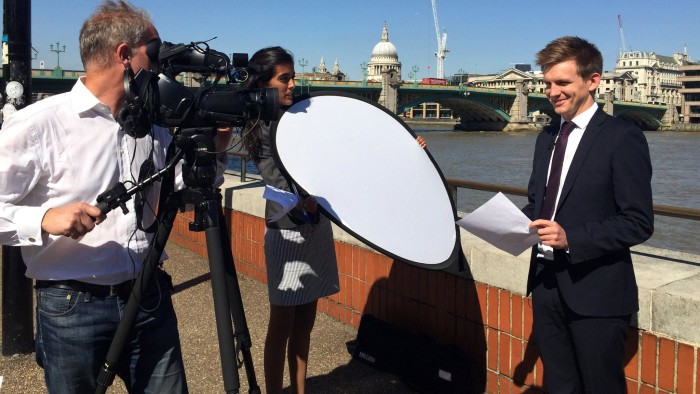FT reporter Paul McClean dies in Sri Lanka

Roula Khalaf, Editor of the FT, selects her favourite stories in this weekly newsletter.
Paul McClean, who died on Thursday while on a beach holiday in Sri Lanka, had only been at the Financial Times for two years, but in that short time proved to be an accomplished young reporter with extraordinary promise.
McClean’s body was identified by friends with whom he was travelling and officials who have spoken to them said he is believed to have been attacked by a crocodile. The final cause of death has yet to be established.
“Paul was a natural,” said Lionel Barber, FT editor. “He had charm, curiosity and an attention to detail — the essential ingredients for a top reporter. He was family. We will miss him sorely.”
“Our thoughts are with his family, friends and loved ones,” said James Lamont, the FT’s managing editor. “We are in touch with them, doing all we can to help during this difficult time.”
Mr Lamont described McClean, who was just a month shy of his 25th birthday, as “a talented, energetic and dedicated young journalist” who had “a great career ahead of him at the FT”. At the time of his death he was a member of the fastFT team in London.
In his previous posting to Brussels, McClean established a reputation as a rising star with in-depth exclusives including his revelation that Britain would have to renegotiate no fewer than 759 treaties with 168 countries after its vote to leave the EU. The startling figures were widely followed by other media outlets, including John Oliver’s satirical show, Last Week Tonight.
The story was the result of almost five months of research in which he delved into archives and databases, interviewed lawyers and policymakers and organised his findings in a sweeping spreadsheet for readers to explore.
A keen squash player and football fan — he described himself as a “long-suffering Evertonian” — McClean was tireless when mastering a new beat, investing weeks in understanding aviation issues to produce a groundbreaking piece explaining the implications of Brexit on the sector.
“He was one hell of a reporter if he was on your case,” said Brussels bureau chief Alex Barker, who recalled his tenacious pursuit of International Airlines Group as he tried to pin the company down on the risks posed by Brexit. His reporting on the topic was well ahead not only of other media but also financial analysts following the company.
“Paul was an inspiration to us all in the Brussels bureau, turning out some of the most original, insightful and deeply researched journalism on Brexit since the referendum. He had a rare gift: an eye for hidden stories, writing flair and the charm to make people tell him anything and everything,” Mr Barker recalled.
McClean, who grew up just outside of London in Thames Ditton, Surrey, graduated from Oxford university with a first-class honours degree in French, having spent his year abroad teaching English and translating for local police officers as the only Briton in that part of the rural Ardennes. “A brilliant student”, his old college Lady Margaret Hall, said on Friday, “remembered not only as a gifted linguist but as a friendly, approachable, energetic and inquisitive young man”.
His “magnificent” French helped in his reporting, Mr Barker noted, such as a story about trawlermen in the port of Boulogne, who catch most of their fish in British waters. “He had a fabulous run-in with the National Front man there who supported Brexit but didn't quite grasp what renationalising waters would mean for his home town.”
His most recent story was a richly reported and suitably sparkling blend of context, data and quotes about the threat climate change poses to the champagne industry.
Katie Martin, head of fastFT, described McClean as “a charming young man, witty and warm and keen to learn, with a ready laugh and a knack for self-deprecation. The clichés are true: he lit up a room, and everyone liked him.”
In August he wrote what he called “a correction 103 years too late”, explaining that the Bank of England had belatedly admitted to exaggerating demand for its 1914 war loan, and that the FT had played a part in convincing the public the debt was oversubscribed. The same edition, he observed, “demonstrated a good understanding of the FT’s readership, noting with ‘interest’ and ‘encouragement’ that champagne production had not been affected by the Great War effort.”
McClean’s talent emerged quickly during a stint covering consumer industries. He wrote a superb account of the Brexit campaign waged through anti-EU beer mats in the Wetherspoon pub chain by Tim Martin, its founder. On a tight deadline, Paul crafted a sharply observed and witty story about his pub crawl in the company of Mr Martin.
“He was great company and wrote a very funny article”, Mr Martin told the FT on Friday. “I didn’t realise he was so young, he seemed extremely mature. He was out all day with me but he spoke to a lot of customers as well as me. He was intelligent as well as self effacing.”
“He made journalism look easy,” said Scheherazade Daneshkhu, the FT’s consumer industries editor, “but he was extraordinarily hard-working, stoically accepting every commission given to him, however thankless.”
“He had a disarming charm, a natural intelligence, and a deep curiosity to find out how the world worked,” said John Thornhill, one of the senior FT editors who recruited him (“an easy decision”).
“We are proud that Paul chose to work with us. He represented the best of what we do.”
…
Here is a video Paul McClean made about the trend of so-called escape room games, in which teams of people are locked in rooms and have to solve puzzles and do other tasks to escape:
Letter in response to this article:
A journalist who was an inspiration to his peers / From Mark Lee, London, UK
Comments